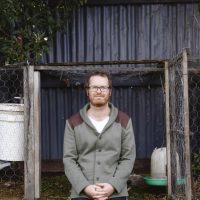A simple life can be a good life
A couple of days ago the following article appeared in the Weekly Times, written by journalist, Sarah Hudson. Photo credit: Chloe Smith
THERE’S a radical revolution happening in Gippsland. But you won’t find any weapons or angry masses.
Instead, on an 8ha property outside Moe, there’s a community peacefully trying to find solutions to problems that ail the planet.
Called Wurruk’an and founded in 2014, the community can house up to 10 people and aims to be a “simpler way demonstration project” of permaculture, organic food, self-sufficiency, renewable energies, mud-building and, of course, composting loos.
Wurruk’an is the brainchild of Melbourne University academic Dr Sam Alexander who says the property is not your typical hippy escapist retreat, but rather offers an alternative to consumer culture and a “post-growth” economy.
“The environmental, economic and cultural crises humanity is facing can seem overwhelming, so great and urgent they have no solutions,” Sam says.
“But rather than sticking our heads in the clay and responding with despair, Wurruk’an aims to contribute to positive transformation.”
While the property is still in its infancy — with four people already living in several of its six tiny homes (adobe, mud, reclaimed wood) and more to come shortly — it has nevertheless made an impact.
Throughout the year it holds workshops and working bees with the public and most recently it hosted documentary makers for the new release film A Simpler Way: Crisis as Opportunity.
The documentary, launched in Melbourne last month and now available on YouTube, intertwines interviews with experts and commentators alongside footage showing the creation of the Wurruk’an community.
While the community is the poster child for Sam’s work, it is by no means his only outlet.
Sam has written five books — the Wurruk’an property owner even gifted the land to Sam for the project’s use after he read the academic’s fictional novel, Entropia.
The 37-year-old is also co-director of the Simplicity Institute, a lecturer at Melbourne University’s Office for Environmental Programs, and teaching a course called Consumerism and the Growth Economy.
Among his many other accomplishments, he is the founder of the website and social network Simplicity Collective.
Sam grew up in New Zealand and was a conventional lawyer with a taste for grunge music, and not “especially materialistic”, when he moved to Melbourne in 2004 to work on his PhD.
Immersing himself in literature, he came across the 1854 book Walden, by Henry David Thoreau, a reflection on simple living in nature.
“Thoreau put in words with such beauty, power and ferocity my vague anti-consumerist feelings,” Sam recalls. “Every sentence was yes, yes, yes. Up to that point I was pretty mainstream, nothing particularly alternative about me, but his manifesto resonated deeply with me.”
Following this, Sam built a $573 wooden shed in the backyard of his shared Melbourne home and lived there for almost three years, spending a total of about $6800 in a year.
“It wasn’t about saying to everyone this is the way to live, but rather answering my personal questions,” Sam says.
“Thoreau looked at American Indians and argued that we don’t need to live in teepees but we need to be aware that bigger houses don’t always contribute positively to our lives.
They might take more of our freedom and time than they give back.”
Sam says it was soon after this the Gippsland property owner approached him with the offer of the land on which to found Wurruk’an (a local indigenous term meaning both “earth” and “story”, while “K’an” is the Mayan term for “seed”).
He says the project is not about hardship or deprivation.
“Mainstream environmentalism calls on us to take shorter showers, recycle, buy green products and turn the lights off, but these measures are inadequate,” he says.
“We need more fundamental change and we need to reimagine the good life beyond consumer culture and begin building a world that supports a simpler way of life.
“We need to focus on what is sufficient to live well. A simple life can be a good life.”
Sam admits his work is a tiny drop in a vast ocean, with all evidence and logic indicating our society’s focus on infinite growth in the context of a finite, fragile planet will, at some point, lead to “systemic collapse”.
Yet, he says, he never allows himself to become despairing.
“I don’t have much hope if we’re waiting for government action but I see hope, passion and desire for change at the community level. That requires a level of emotional resilience. You have to have faith our efforts are useful even though it’s a drop in the ocean and the problems are massive.
“Ultimately we don’t have a right to ask whether we’ll succeed or not. We just have to do the right thing. It’s just something we ought to do.”




